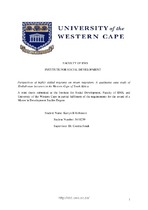| dc.description.abstract | Brain drain has been labelled as one of the greatest development challenges facing African countries as it challenges capacity building, retention of skilled workers and sustained growth. Over the past two decades, a large number of Zimbabwean academics have left the country in search of economic opportunity and further academic training. This out-movement of academics has been exacerbated by political crisis and economic crisis in the country over the same period. Although some studies have sought to explain the causes, consequences and recommended policy responses to this human capital flight, they have not been able to critically assess, from the perspective of the emigrated academics, the conditions that would make them repatriate, their willingness to return to their home country and contribute to training, research and development; or their disposition towards engaging with Zimbabwean universities. | en_US |

